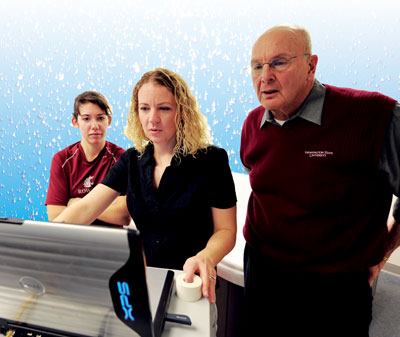Most people instinctively realize that hot water promotes better health, but few researchers, if any, have studied it as extensively as Dr. Bruce Becker.
“It’s known that some of the effects we’ve seen with warm-water immersion are similar to those seen with meditation and also a number of medications that are used for stress management,” says Becker, who is a research professor at Washington State University in Pullman, Wash., and director of its National Aquatics & Sports Medicine Institute. He also conducts various aquatic therapy studies for the National Swimming Pool Foundation in Colorado Springs, Colo.
Much of his current work involves warm- and hot-water immersion research, which he carries out in a laboratory equipped with three hot tubs. The experiments he performs in those few vessels could eventually help give the hot tub industry a needed jump-start.
Becker’s team has studied, among other things, the way in which hot water effects blood pressure and the heart. And while these results can also be achieved by soaking in a bathtub, Becker believes the hot tub industry could benefit from incorporating the information into their marketing.
Though some spa dealers and manufacturers have begun to increasingly promote the health aspect of the product, many still rely solely on the lifestyle appeal to move units. Becker hopes that as his research is more fully disseminated throughout the industry, a deeper pool of consumers who seek the health benefits of hot tubs can be reached.
Becker has been studying aquatic therapy for decades. In the early 1980s, he became a team physician for Nike’s Olympic development program, and was shocked by how quickly injured athletes would recover when they received in-pool therapy. But because the lower temperatures found in traditional swimming pools can aggravate the sympathetic nervous system, which is responsible for stress response, Becker wanted to explore the benefits of aquatic therapy in warmer waters. That led to his work with the NSPF.
During his quest to fund the research, Becker searched the Internet for possible sources. That’s how he got in touch with the foundation, which has long allocated grants to further pool and spa industry research.
The group invited Becker to speak to its board of directors in early 2005. He was given 12 minutes on the agenda, but ended up staying at the podium for well over an hour to answer the questions from fascinated board members. “I said I should get off and let them take care of their real business, but they told me [this research] was more important than anything else.”
The group then reached out to spa manufacturers to finance the research, which officially began in early 2007. Hot tub makers who have contributed to Becker’s immersion studies since then include Dimension One Spas Inc., Jacuzzi Hot Tubs, Lucite Intl., Marquis Corp., Master Spas, Sundance Spas Inc., Vita Intl. and Watkins Mfg. Other interested companies such as AB Publications, Aristech Acrylics, LLC, Gecko, King Technology and retail firm Olympic Hot Tub Co. also have donated. The hot tubs that sit in Becker’s lab were provided by Hot Spring Spas.
The NSPF matched each donation at least dollar for dollar, sometimes providing additional funds to Becker in hopes of advancing the industry. “Almost every human most values their health,” says Thomas Lachocki, the organization’s CEO. “Yet [many] hot tub retailers and manufacturers have lost sight of how our products link to this value. Dr. Bruce Becker is one star who can help every retailer and manufacturer understand and spread the word of immersion health benefits.”
Currently, Becker is trying to secure funds for a study that examines the effect of warm water on joints in the body. Research on this topic, which has great potential for arthritis treatment, surprisingly has never been done before.
“People have been using warm water to treat arthritis as far back as ancient Egypt and certainly Greece and Rome,” he says. “We want to find out why it has certain effects on joint function.”
Down the line, Becker also believes he can pinpoint hot water benefits on post traumatic stress disorder, which also deals with a dominant sympathetic nervous system, as well as learning disabilities, drug addiction and other societal issues.
“Our research is still very early, but it is extremely positive,” he says. “If we really understood how to neurologically recreate the effects, it could have a huge impact.”




